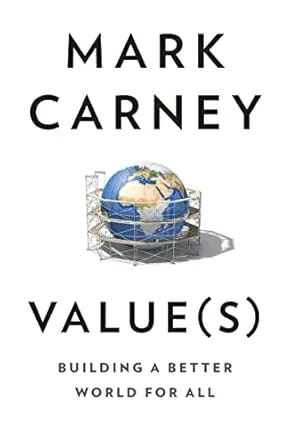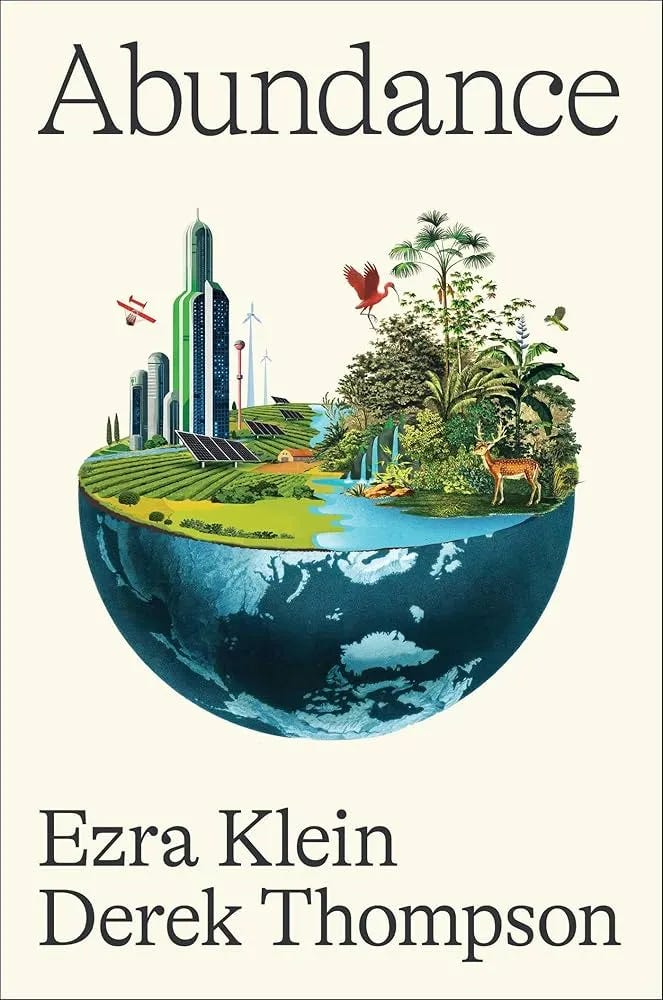The realpolitik of fools
In the centrist imagination, we are perpetually One Weird Trick away from realizing a liberal capitalist utopia that never actually comes
Between Mark Carney’s 2021 bestseller Value(s) and the much-discussed Ezra Klein/Derek Thompson joint Abundance, I have consumed a fair amount of centrist literature over the past few months. Because I’ve already written about the latter book for this Substack, and because I currently have an essay in the works on the former, I don’t plan to discuss either of them in too much detail below.
Nonetheless, my immersion in both these books has had me thinking a lot about one of the basic category errors in contemporary political discourse: namely, the association of centrism with pragmatism, meliorism, and moderation on the one hand and the political left with a quixotic idealism (and/or utopianism) on the other.
Throughout my whole life, the centrist identity has leaned heavily on the idea that only moderates and liberals really know how to “get things done.” This is partly, we’re told, thanks to superior competence, administrative know-how, and policy expertise. But it’s also because centrists, in all their pragmatic wisdom, actually understand the obstacles facing any legislative or policy change of real scope or substance. The left, in contrast, is said to practice a kind of magical thinking motivated more by dogmatism and ideology than by the hardened realpolitik of political adults.
Its cynical weaponization of identity politics aside, this was the basic charge levelled by the Hillary Clinton campaign against Bernie Sanders back in 2016. You find the same thing today running through the various moderate and wonk dismissals of Zohran Mamdani’s proposals in New York City, and some version of “That will never get through Congress!” has been the staple centrist excuse around healthcare reform for several decades at least.
The first problem with conceiving of the divide between left and centre in these terms is that it misleadingly represents an argument over ends as a dispute about means. This particularly frustrates me, because it’s long been obvious that centrist liberals and their fellow travellers want something fundamentally different from those of us on the left.
Moderate Democrats, to take one example, don’t actually oppose single-payer healthcare because they think the necessary legislation is unlikely to pass, but because they’re ideologically opposed to it (back in 2020, Joe Biden said he would veto such legislation even if it successfully passed!). They don’t actually want a robust welfare state or a comprehensive infrastructure of social security. They generally think the private sector does most things better than a public sector can and, even where it visibly doesn’t, have deep ideological reservations about the state supplanting private industry or overriding the profit motive. This is not, ultimately, a debate between two sides that hold competing conceptions of how to reach the same (or similar) goals.
To return to the two books I mentioned above, however, there is also a more fundamental problem at work here. Reading both Abundance and Carney’s Value(s) what struck me most was the vast chasm separating their respective authors’ stated ends and the means they suggested could be used to achieve them. In their own different ways, these are both centrist treatises that pair grand visions of a better future with prescriptions that are so minimalist by comparison each had me scratching my head.
In Value(s) Carney quite literally spends hundreds of pages detailing the various crises facing contemporary liberal capitalism, from financialization and inequality to climate change. He readily acknowledges that markets are not moral instruments and that societies need to draw their ethical resources from a different source. By the same token, Abundance contains plenty of fair observations about the catastrophic failures of Democratic governance in blue cities — from crumbling infrastructure to rising homelessness — and even makes a few quite prescient arguments about the limits of the consumerist economy. Its authors, whatever else, understand that the political and economic status quo is failing in quite fundamental ways to meet basic human needs like housing, and that rich states like California have comprehensively failed to get critical infrastructure built.
But in the prescriptive parts of both these books, we ultimately find a kind of magical thinking at work that closely resembles the sort wrongly associated with the left.
To wit: Ezra Klein and Derek Thompson begin their book with a utopian sketch of a near-future in which climate change has been solved, housing is abundant, towns and cities are linked by a vast network of high speed trains that all run on time, and drones deliver cheap pharmaceutical drugs from orbit to all those who need them. They then spend the remainder of their book suggesting that the route to this Jetsons-esque futurist vista consists in zoning reform and the elimination of a handful of (mostly local) regulatory barriers! In the same vein, Mark Carney spends multiple chapters telling us that markets are limited and imperfect instruments, then concludes that the solution to major global crises like climate change and economic inequality consists in a kinder, gentler business class that voluntarily decides to operate in a more enlightened and socially-conscious manner.
In the centrist imagination, it seems, we are always perpetually One Weird Trick away from achieving the utopian ambitions of liberal capitalism: just eliminate some regulations and you’ll soon have flying cars and high speed rail; if New York and California merely adopted Texan zoning policies, everyone could be housed in a matter of years; with little more than a renewed commitment to ethical corporate governance and a pep talk from a former central banker, profit-driven multinationals might suddenly transform into moral actors, the planet might be saved, and opportunity would abound for all.
This, to me, seems more like magical thinking than hardened realpolitik. It’s not that the left has some One Weird Trick of its own, of course. No serious person who takes stock of the world today can possibly believe than transforming it will be simple or easy. But in contemporary debates, the very faction telling us that something like free bus service in America’s largest city is impossible to achieve also insists we are just a few regulatory changes away from becoming carbon neutral and solving the housing crisis.
To reiterate: no one, whatever their stated goals might be, should assume sweeping political change can be achieved with simplicity or ease. In the 21st century, even modest progress at the local or national level requires discipline, creativity, and hard work. But, if we’re actually interested in addressing climate change, rolling back economic and social inequality, or making life more dignified and secure for the average person, we must start by grappling seriously with what doing so would actually require.
In a meta-political sense, the left’s view isn’t that change in these areas will be easy; it’s precisely that they will be hard. It’s also, importantly, that change is morally (and, in the case of climate change, existentially) necessary. Given the state of global capitalism in the 21st century, there is no alternative to a left wing realpolitik that recognizes at once the difficulty and the necessity of transforming our institutions, our economic structures, and our ways of living together.
Anchoring our political practice in these principles doesn’t always guarantee success. Far from it. But, between one approach that tries to change society through mass mobilization and another that contends we can achieve utopia with more ethically-minded corporations and zoning reform, I know where I’ll be putting down my chips.





For me one of the most useful things I've read on neoliberal thought is Naomi Klein's point in The Shock Doctrine that neoliberalism's aim is to remove the entire economic field from political contestation. Economics has been solved; therefore the only remaining political question is how best to serve the market. Basically all recent interventions by centrist figures, whether it's Abundance or establishment Dems freaking out about Mamdani, are an attempt to protect that 'solved' economic doctrine from anyone who would seek to contest it.
Also as I've been reading The Uninhabitable Earth recently, Klein and Thompson's "sketch of a near-future in which climate change has been solved" seems literally utopian: an impossible vision, totally out of touch with reality. So many people in the elite simply do not understand (or won't allow themselves to acknowledge) how far things have already gone.
My favorite part is just how dumb and naive the elite neoliberal class is. They have absolutely no idea how, for instance, industrial production or agriculture works, what it’s like to work for a wage, how the healthcare system works (or doesn’t work, in the case of the US).
Nor do they have any interest in trying to incorporate some of the working class experience into their program in order to neutralize some of the simmering discontent among the public, a la FDR and the New Dealers.
We are living in a constant repeat of Lucille Bluth asking, “I mean it’s one banana, Michael, how much could it cost? Ten dollars?”